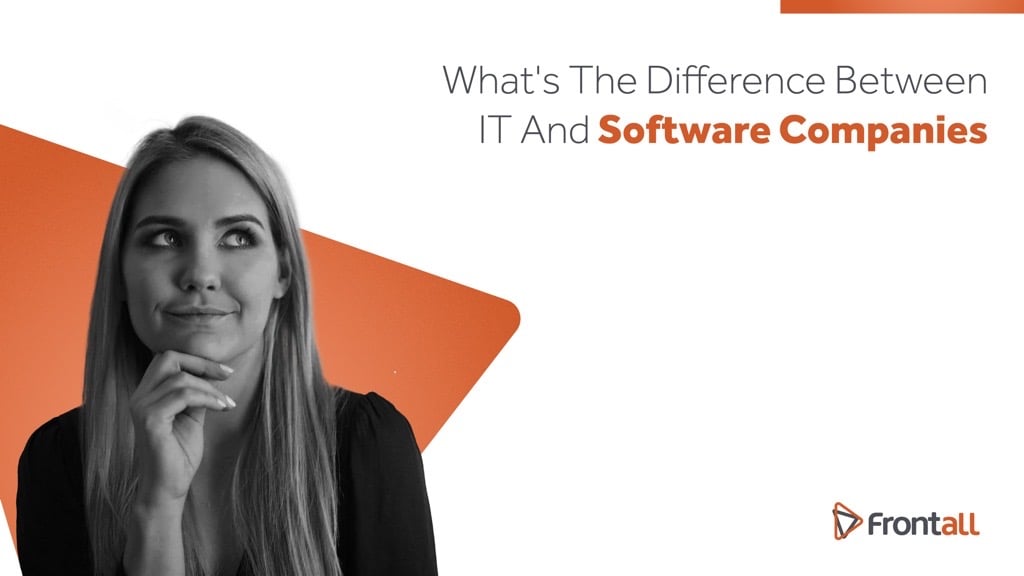What is The Difference Between IT And Software Companies
Many people still get confused when it comes to the differences between IT and software companies. It is often understood that every software company is an IT company, and every IT company is a software company. Therefore, understanding the functions of these companies is essential. Each serves a different purpose, which is to help organizations operate more efficiently.
IT (Information Technology) deals with technology in general, including software, but it may or may not be its specialty. As the name suggests, software companies specifically focus on software.
IT Companies
IT companies handle everything related to computers, the Internet, support, and digital solutions. Thus, an IT company can encompass more than one service, including network setup and maintenance, hardware installation and support, cybersecurity implementation, and software, which is a system for processing data on a computer. Therefore, it is correct to say that every IT company works with software services.
If you want to learn more about IT and what other services this field can offer, check out this article: What Are Information Technology Services?
Software Companies
A software company is a company that creates and distributes software products. They use technology to build tools, programs, and systems for various purposes, such as improving productivity, communication, entertainment, and education. These companies do not produce hardware but focus exclusively on software development. They employ programming languages, design elements, and frameworks during the design and programming stages, as well as in application testing and the launching of new software solutions.
Some software companies specialize in specific areas such as mobile app development, web app development, enterprise software, games, or artificial intelligence. They also handle quality assurance and continuous integration to ensure that their software runs smoothly and meets the intended purpose.
How Does a Software Company Work?
If you’ve read the article, What Are Information Technology Services? you already understand how IT companies operate and how their services can benefit your business.
However, to grasp the key differences between IT and software companies, it’s essential to understand how software companies function and work.
Software companies provide programs and software that are regularly used by individuals and businesses. Their main function is to create programs that facilitate communication and collaboration within a company. To ensure quality service, they typically follow these steps:
- Development: They use agile methodologies to create well-designed software.
- Design: This crucial step focuses on the functionality for the user and involves extensive testing. The design is refined and transformed into a product that the final user can interact with.
- Programming: The company codes the software, with programmers ensuring it meets the required specifications. Software companies, and specifically their programmers, are also involved in maintaining and making updates to existing software.
Key Differences between IT and Software Company
As seen, IT companies and software companies are both integral parts of the technology industry, but they have distinct focuses and offerings for different needs.
The main differences begin with the services provided by each type of company. While IT companies offer a broader range of technology services, including network setup and maintenance, hardware installation and support, and cybersecurity implementation, software companies focus on a more specific market, such as developing, distributing, and maintaining software products. Their primary focus is on creating software solutions for various purposes, including custom software development, mobile and web application development, and software product design and prototyping.
Business Model
Commonly, the business model adopted by IT companies is service-oriented and it involves charging for regular support, consulting, and the implementation of IT solutions. They can also sell hardware and software as part of their products.
Software companies take a different operation, with various business models depending on the company being contracted. These models can vary between selling licensed software products, offering software as a service (SaaS) solutions, charging for custom software development services, and providing ongoing software maintenance and support.
Budget
Nowadays, the primary goal of large companies is to find a collaborator who can provide high-quality service at a good price. So, if you still have doubts about which service is ideal for your business, the budgets of each option can make a difference in this decision.
If your business needs greater flexibility, software companies offer pricing that better accommodates product development cycles. Also, if your focus is on scalability, software companies plan more quickly, which is reflected in cloud infrastructure budgets.
Regarding product life cycles, software companies experience more spending spikes during product development and launch.
Finally, if security is your top priority, both companies invest heavily in this aspect. However, IT companies may need to allocate more resources for compliance and physical infrastructure security
Conclusion
Therefore, if your company aims to improve and optimize its technological operations, investing in a software or IT company is essential. Thus, understanding that both operate in the technology sector and recognizing their differences is crucial to finding the right partner who will help your business grow.
Understanding your company’s needs is the first step for each organization. Companies that require a full range of technological services may benefit more from partnerships with IT companies. On the other hand, those seeking specific and innovative software solutions may find greater value in collaborating with specialized software companies.
The resolution must depend on a thorough examination of business objectives, technological requirements, and long-term strategies. Knowing these differences enables companies to make informed decisions, aligning their technological needs with the most suitable partners to boost their development and operational efficiency.
